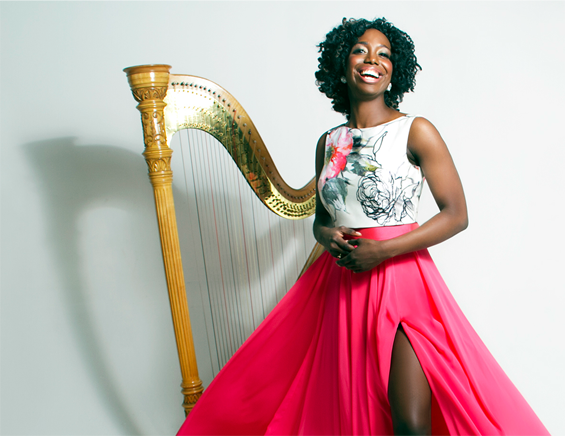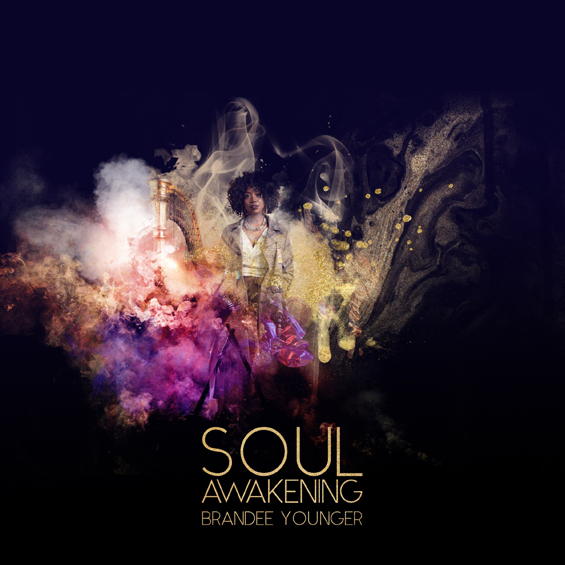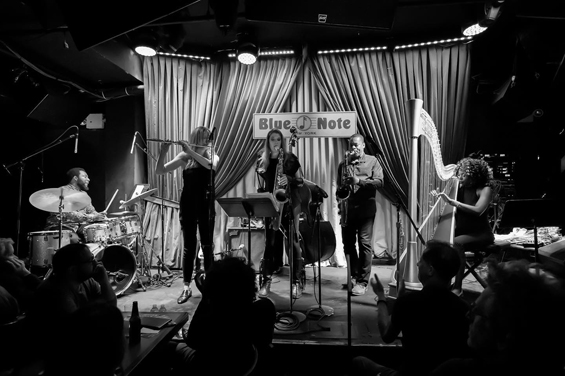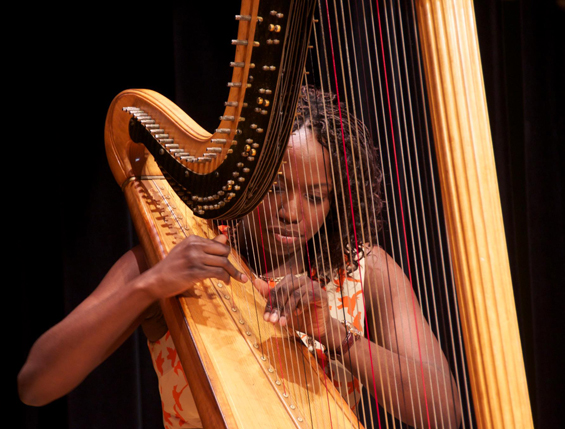

FIVE QUESTIONS WITH BRANDEE YOUNGER
Currently promoting her latest release Soul Awakening, Brandee Younger brings a wealth of experience to any project with which she's involved, jazz-related or otherwise. Though the classically trained, New York-based harpist has graced classical concert stages and performed with an array of orchestral ensembles, the versatile Younger's also worked with jazz luminaries such as Jack DeJohnette, Kenny Garrett, Christian McBride, and Ravi Coltrane, not to mention R&B and hip-hop artists John Legend, Common, Lauryn Hill, and The Roots. Her association with Ravi has proved particularly important, however, the tenor saxist cited by her as one of two key mentors, Antoine Roney the other. Being a harp player, Younger was naturally influenced by Ravi's mother, Alice, and has performed with him in concerts dedicated to the music of the late pianist, organist, and harpist. Through such critical associations as these, Younger has developed her own voice while at the same time honouring those who came before her. textura caught up with the harpist at an especially busy time and is all the more grateful to her for making time to talk with us about the new release (reviewed here) and other relevant matters.
1. Soul Awakening is such an exceptional collection I'm wondering why it's only coming out now when it was completed and ready for release in 2013. And is the music you're creating and performing today (as documented on 2016's Wax & Wane, for instance) different, stylistically and otherwise, from the material on Soul Awakening?
Thank you so much for the kind words; honestly, I never intended to wait so long to release it. I allowed other releases (Live at the Breeding Ground, Supreme Sonacy, and Wax & Wane, plus A Day In The Life: Impressions of Pepper – a tribute to the Beatles, Sgt Pepper's Lonely Hearts Club Band, on which I appear) to sort of take precedence. When we initially recorded the album, we had two incomplete products that I later decided to put together. We probably recorded about thirteen tracks and eight ended up on the record. I do see some stylistic changes between the record and what we're playing now. Even on the repertoire that is the same, playing it has become more organic for everyone in the ensemble.

2. In the press material accompanying the album, saxophonists Antoine Roney and Ravi Coltrane are cited as “two of [your] greatest mentors.” Could you elaborate on how the two mentored you?
Both Antoine Roney and Ravi Coltrane have played major roles in my development as an artist, outside of formal schooling. Mentorship—in my opinion—is one of the most vital aspects of learning music, playing music, and operating as a professional in the industry. They both made themselves available, teaching me by example, leadership, and offering so much history. I feel incredibly lucky to have learned so much about our most treasured figures in music. As many of us know, Antoine is a wealth of knowledge and stories. As well, Ravi has not only offered me various platforms to help me to develop as an artist, he played a key role in helping my sound develop to what it is today.
3. You've acknowledged harpists Dorothy Ashby and Alice Coltrane as profound influences, and compositions by both, “Games” and “Blue Nile,” respectively, appear on Soul Awakening. Further to that, Ravi Coltrane selected you to perform at his mother's memorial service in 2007, and you've also worked with him on a number of projects (in fact, I had the very good fortune to see you perform with him at New York's Jazz Gallery in July 2017 in “Universal Consciousness: Melodic Meditations of Alice Coltrane”). In what ways specifically did Dorothy Ashby and Alice Coltrane inspire and influence you? And has it been challenging to establish your own artistic identity when the two cast such large shadows?
Both Dorothy Ashby and Alice Coltrane have been major influences on a cultural and musical level. Growing up, playing such a rare instrument, it is not often that a young African American woman sees the grown-up version of themselves. I didn't realize just how much of an impact they both had on me at the time, but merely learning that they existed gave me validation and confidence to know that, “Yes, I can play this instrument and also walk the path less traveled.” Representation is MAJOR.
I haven't found it a challenge to establish my own artistic identity because I still feel that their contribution is under-celebrated. You really won't find me playing a concert where I don't reference them in some form or fashion, whether by playing their music or my own, giving them a nod. At the same time, I make it a point to include my original music in each performance as well and hopefully, the more I write, the easier it'll be to establish my own musical identity.

4. Give how much the harp's profile has been raised by figures such as Dorothy Ashby, Alice Coltrane, and you, are we now at a point where the harp is regarded as legitimate an instrument for a jazz context as any other?
I'm really happy when I sign on Instagram or Facebook and see so many players stepping outside of the box of classical music. I think that the harp is slowly gaining respected recognition outside of Classical and Celtic worlds. The music world and major harp companies are all taking note, and it's a beautiful thing.
5. What issues, artistic and otherwise, are engaging you and how are they manifested in the music you're creating? Social justice, for example, would appear to be one, given that Marvin Gaye's “Save the Children” appears on Soul Awakening as a tribute to Ana Grace Marquez-Greene, one of the victims of the Sandy Hook shooting and the daughter of musician Jimmy Greene and Nelba Marquez-Greene.
One track that has been released as a single that I left off of this record is “He Has a Name (Awareness),” which I wrote when Trayvon Martin was killed in 2012. That case hit me really hard as I have a younger brother that looks and dresses just like Trayvon. That could have been my brother and the fact is, when something happens in our community, it affects us all. Trayvon was my brother in so many respects.
Ana Marquez-Greene was not only part of our community, not only the daughter of great friends of all of ours, not only an innocent child (that I also hoped would take up the harp), but she was a child that the world lost. I don't speak freely about political issues. It's an instance that I'm really grateful to have art to express the views that I do have. Another major issue aside from those mentioned is the issue of mass incarceration and cash bail. If I can use my art to help make even a small change, then my living won't be in vain.

Bonus question: You've worked with a remarkable range of artists, from Ravi Coltrane, Kenny Garrett, and Jack DeJohnette to Common, John Legend, and Lauryn Hill, and you also perform in classical contexts. In what ways do you adjust your approach (if you do) when you're playing in such different settings?
Good question! I do have to adjust my approach for different settings, but I'll admit that each style that I play has informed the others. When I play classical music now, I feel my approach to phrasing has changed drastically compared to how I was taught to phrase certain repertoire. I now hear things much differently than I did when I was younger. So, I take liberties these days—I hope that's okay!website: BRANDEE YOUNGER
June 2019
![]()